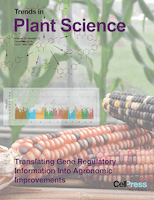
TRENDS IN PLANT SCIENCE
Scope & Guideline
Advancing Plant Science Through Innovative Research
Introduction
Aims and Scopes
- Molecular Plant Biology:
Research exploring the molecular mechanisms underlying plant growth, development, and responses to environmental stimuli, including gene regulation, signaling pathways, and metabolic processes. - Plant Ecology and Evolution:
Studies investigating the ecological interactions among plant species and their environments, as well as evolutionary adaptations that influence plant diversity and ecosystem functioning. - Plant-Microbe Interactions:
Research on the complex interactions between plants and microorganisms, including beneficial relationships with symbiotic fungi and bacteria, as well as responses to pathogenic threats. - Crop Improvement and Biotechnology:
Innovative approaches in plant breeding, genetic engineering, and biotechnology aimed at enhancing crop productivity, resilience, and sustainability in agricultural systems. - Environmental Stress Responses:
Investigations into how plants perceive and respond to abiotic and biotic stresses, including drought, salinity, and pathogen attacks, and the underlying physiological and molecular mechanisms. - Sustainable Agriculture and Food Security:
Research addressing challenges in agricultural productivity and sustainability, focusing on practices and technologies that promote food security while conserving natural resources.
Trending and Emerging
- CRISPR and Genome Editing:
The rise in research utilizing CRISPR technology highlights a significant trend towards precise genome editing in plants, aiming to enhance traits such as disease resistance, yield, and environmental adaptability. - Artificial Intelligence and Machine Learning:
Emerging themes in the application of AI and machine learning to analyze plant data and improve breeding techniques, showcasing the integration of technology in advancing plant science. - Plant Response to Climate Change:
Increasing focus on how plants adapt to climate change, including studies on resilience mechanisms and the impact of changing environmental conditions on plant physiology and ecology. - Multi-Omics Approaches:
A trend towards employing multi-omics strategies (genomics, transcriptomics, proteomics, and metabolomics) to gain comprehensive insights into plant biology and interactions with their environment. - Microbiome Research:
Growing interest in the role of plant-associated microbiomes in health and productivity, emphasizing the importance of microbial interactions in sustainable agriculture. - Innovations in Plant Defense Mechanisms:
Research on novel plant defense strategies against pathogens and pests, reflecting an increasing interest in understanding and leveraging plant immunity for crop protection.
Declining or Waning
- Traditional Plant Breeding Techniques:
As molecular biology and genetic engineering techniques advance, the emphasis on traditional breeding methods may be declining, with less frequent publications focusing on these older methodologies. - Conventional Agricultural Practices:
Research on conventional farming practices seems to be decreasing, reflecting a broader shift towards sustainable and innovative agricultural strategies that prioritize ecological balance. - Basic Taxonomy and Systematics:
There appears to be a reduced focus on basic taxonomic studies and systematics, possibly overshadowed by more applied research that addresses immediate agricultural and ecological challenges.
Similar Journals

Annual Plant Reviews Online
Unveiling Insights in Horticulture and AgronomyAnnual Plant Reviews Online, published by WILEY, serves as a premier academic resource dedicated to the evolving field of plant sciences, including specialties in agronomy, horticulture, and food science. With an impressive Q1 ranking in Horticulture and Q2 classifications in Agronomy, Crop Science, and Plant Science, this journal reflects a high standard of scholarly contribution, evidenced by its positioning in the 75th percentile range among agricultural and biological sciences in leading Scopus rankings. Aimed at researchers, professionals, and students alike, the journal covers a broad spectrum of plant-related topics and trends, aiming to enhance the understanding of plant biology and its applications. Offering timely insights and critical reviews, Annual Plant Reviews Online connects the global community with essential knowledge, supporting advancements in sustainable practices and innovations in agriculture. Researchers and students can access its content seamlessly, contributing to ongoing discussions in plant science and fostering academic growth.
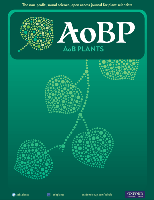
AoB Plants
Advancing plant science through open access.AoB Plants is a distinguished open-access journal published by Oxford University Press, dedicated to advancing the field of plant science. Since its inception in 2009, this journal has played a pivotal role in disseminating high-quality research that encompasses a wide range of topics including plant biology, ecology, and biotechnology. With an impressive impact factor and a ranking in the Q1 quartile for Plant Science, AoB Plants is recognized for its innovative contributions and scholarly rigor, ranking #129 out of 516 in the Scopus Agricultural and Biological Sciences category, placing it in the 75th percentile among its peers. By promoting open-access availability of research findings, the journal empowers researchers and practitioners alike, facilitating greater collaboration and knowledge sharing in the global scientific community. Situated in the heart of the United Kingdom, AoB Plants continues its commitment to providing a platform for pioneering research and developments in plant science, thus fostering a deeper understanding of the crucial roles that plants play in our ecosystems and economies.
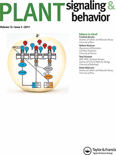
Plant Signaling & Behavior
Bridging Science and Nature: The Language of PlantsPlant Signaling & Behavior is a prestigious journal published by TAYLOR & FRANCIS INC, dedicated to advancing the understanding of the complex signaling mechanisms and behavioral responses of plants. With an ISSN of 1559-2316 and an E-ISSN of 1559-2324, it has firmly established itself in the field of Plant Science, earning a Q1 ranking in the 2023 category quartiles and ranking #83 out of 516 in Agricultural and Biological Sciences, placing it in the 84th percentile according to Scopus metrics. The journal serves as a vital platform for researchers and professionals looking to publish innovative studies and reviews that explore the intricate relationships between plant behavior and environmental signaling. With coverage spanning from 2006 to 2024, Plant Signaling & Behavior not only enhances academic discourse but also supports the growing interdisciplinary nature of plant sciences. Although the journal is not open access, it remains a significant resource for students, researchers, and practitioners aiming to deepen their understanding of plant signaling and its implications for ecology and agricultural practices.
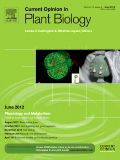
CURRENT OPINION IN PLANT BIOLOGY
Exploring Innovative Insights in Plant BiologyCURRENT OPINION IN PLANT BIOLOGY is a premier academic journal published by CURRENT BIOLOGY LTD, dedicated to providing comprehensive insights and critical analyses on the latest advancements in the field of plant science. Established in 1998 and with a circulation slated until 2024, it holds an impressive Q1 ranking in the prestigious plant science category, reflecting its significant contribution to the discipline. With a Scopus rank of #11 out of 516, the journal is positioned in the 97th percentile, underscoring its influential role in shaping contemporary research. Although it does not offer open access, the journal provides valuable information that is essential for researchers, professionals, and students alike. The ISSN for this influential journal is 1369-5266, and its online presence is marked by the E-ISSN of 1879-0356. As a critical platform for the exchange of ideas and cutting-edge findings in plant biology, CURRENT OPINION IN PLANT BIOLOGY continues to be a vital resource for those looking to advance their understanding of plant systems and innovations across agricultural and biological sciences.

PHYSIOLOGY AND MOLECULAR BIOLOGY OF PLANTS
Pioneering Discoveries in Plant PhysiologyPHYSIOLOGY AND MOLECULAR BIOLOGY OF PLANTS, published by SPRINGER, is a vital journal focused on the advancing field of plant science. Featuring research that spans physiology, molecular biology, and their applications in agriculture, this journal is pivotal for academics, professionals, and students keen on understanding plant processes and enhancing crop production. With an ISSN of 0971-5894 and an E-ISSN of 0974-0430, this journal is recognized for its scholarly significance, ranking in the Q3 category in Molecular Biology, Q2 in Physiology, and Q1 in Plant Science as of 2023. The journal maintains a strong position in the Scopus rankings, with notable percentile rankings including 87th in Plant Science. Established in 2000, this publication aims to foster the dissemination of cutting-edge research by providing a platform for open discussion and knowledge sharing about plant physiology and molecular mechanisms. While it does not currently offer open access options, its comprehensive studies and reviews serve as an essential resource for enhancing our understanding of plant biology.

BIOLOGIA PLANTARUM
Cultivating Knowledge in Horticulture and BeyondBIOLOGIA PLANTARUM, esteemed within the realms of horticulture and plant science, is a leading academic journal published by the Academy of Sciences of the Czech Republic, Institute of Experimental Botany. Established in 1959, this journal showcases innovative research and advancements in plant biology, focusing on a spectrum of topics including plant physiology, genetics, and biotechnology. With an impressive Scopus ranking in Horticulture (Rank #41/115) and Plant Science (Rank #221/516), it holds a significant place in the academic community, reflected in its Q2 and Q3 status within its respective categories. Although it is not open access, authors are encouraged to contribute to the growing body of knowledge that supports sustainable practices in agriculture and horticulture. Published in the Netherlands, BIOLOGIA PLANTARUM continues to foster collaboration and dialogue among researchers, professionals, and students dedicated to understanding and advancing plant sciences.
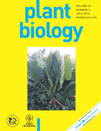
PLANT BIOLOGY
Cultivating Knowledge in Ecology and EvolutionPLANT BIOLOGY is a prestigious academic journal published by Wiley, dedicated to advancing knowledge in the fields of plant science, ecology, and evolutionary biology. With an impressive impact factor and ranking in the Q1 category for Ecology, Evolution, Behavior and Systematics, and Plant Science as of 2023, it stands at the forefront of research dissemination. The journal encompasses a broad scope of plant biology topics, providing a critical platform for researchers to share innovative findings and foster interdisciplinary collaboration. Available in both print (ISSN: 1435-8603) and online formats (E-ISSN: 1438-8677), it ensures accessibility through open access options. As a crucial resource for professionals, researchers, and students alike, PLANT BIOLOGY cultivates a deeper understanding of plant systems and their ecological significance, making it an essential addition to the library of anyone dedicated to the study of biology and the environment.

aBIOTECH
Fostering collaboration for a thriving scientific community.aBIOTECH, published by SPRINGERNATURE, is a premier academic journal dedicated to advancing the fields of biotechnology, agronomy, and molecular biology. With an impressive ISSN of 2096-6326 and E-ISSN 2662-1738, this journal has established itself as a vital resource for researchers and professionals aiming to publish high-quality, impactful studies. Based in Singapore, aBIOTECH has achieved remarkable recognition, boasting a Q1 ranking in multiple categories including Agronomy and Crop Science, Biochemistry, and Genetics in the 2023 Scopus rankings. Its solid position in the 90th percentile for Biochemistry and Genetics reinforces its significance within the global scientific community. The journal covers a broad spectrum of topics relevant to both basic and applied research, facilitating a shared dialogue amongst scientists and encouraging collaborative progress in innovative biotechnological applications. The open-access nature of the journal ensures that cutting-edge research is freely available, fostering a global exchange of ideas that is critical to the advancement of science today.

MYCORRHIZA
Pioneering Research in Ecosystem DynamicsMYCORRHIZA is a prestigious journal dedicated to the exploration of mycorrhizal symbiosis and its implications across various biological disciplines. Published by SPRINGER, this journal serves as a crucial platform for researchers and professionals in the fields of ecology, plant science, and molecular biology. With an impressive impact factor reflected in its 2023 quartile rankings—ranking Q1 in both Ecology, Evolution, Behavior and Systematics and Plant Science, as well as Q2 in Genetics and Molecular Biology—MYCORRHIZA plays a significant role in disseminating groundbreaking findings that advance our understanding of plant interactions and ecosystem dynamics. The journal has been active since 1991 and continues to publish cutting-edge research through 2024, ensuring that its audience remains at the forefront of scientific innovation. For additional information about publication protocols and submission guidelines, please refer to the journal's website.

PLANTA
Elevating botanical research to new heights.PLANTA, published by SPRINGER, stands as a pivotal journal in the field of plant sciences and genetics, known for its rigorous peer-reviewed research that has influenced the advancement of botanical science since its inception in 1925. With an impressive trajectory of convergence from the years 1925 to 1945, and again from 1947 to 2024, this journal maintains a strong reputation, currently categorized in the prestigious Q1 tier of Plant Science and Q2 tier in Genetics as of 2023. The journal is recognized for its high impact, ranked #64 out of 516 in Plant Science by Scopus, representing the top 87th percentile within its category, while also securing a strong position in Genetics with a #92 rank. The journal serves as a critical resource for researchers, professionals, and students who are eager to explore the complex genetics, biochemistry, and evolutionary biology of plants. Though primarily subscription-based, the quality of the research published in PLANTA makes it an essential reading for anyone serious about advancing their knowledge and understanding of plant sciences.